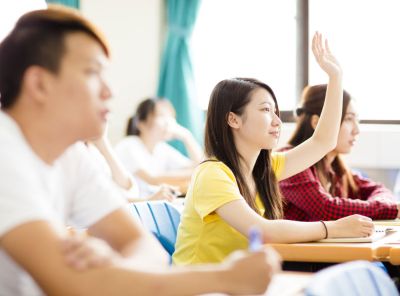|
|
|
|
|
|
| Extravert Chinese students learning English as a second language are likely to perform better in speaking and reading, but less proficient in listening than their introvert counterparts, according to a study published in Pertanika Journal of Social Sciences and Humanities (JSSH). |
SELANGOR, Malaysia, July 14, 2017 - (ACN Newswire) - In Chinese culture, students are expected to listen to their teachers attentively, as opposed to Western culture where class participation is encouraged. The Chinese culture is influenced by Confucian values, including collectivism, socialisation for achievement, and high acceptance of power and authority. Some studies have suggested that such introversion hinders Chinese students' ability to learn English as a second language.
 | | Some studies have suggested that introversion tendency hinders Chinese students' ability to learn English as a second language. (Credit: Wang Tom/123rf) |
However, it is unclear if a relationship exists between extraversion-introversion traits and English language proficiency for nonnative speakers. In an ongoing debate, psychologists argue introverts are less susceptible to distraction and have better long-term memory, while linguists claim the extraverts' sociable and outgoing attitudes, as well as their high tolerance to risk, help with learning a foreign language.
Study of this topic that involves Chinese students based in Asia is lacking, explains Assistant Professor Shahcla Zarfar at the University of Central Punjab, India.
Zarfar and colleagues examined whether Chinese students are introverted by nature, whether extravert-introvert tendencies affected English language proficiency among Chinese students in India, and how these traits influenced language learning.
The researchers analysed the data from 145 Chinese exchange students aged between 18 and 21 at VIT University, Vellore, India. The data comprised of English language test scores and two types of questionnaires - one asked about personality and linguistic information, and the other only about their personality.
They found the majority of the students were introverts (47%), followed by extroverts (35%), and 'no tendency towards the extroversion-introversion traits' (18%). The team confirmed a significant relationship between the two personality traits and English language proficiency, with higher scores in speaking, reading and overall language proficiency for extravert students. There was little difference in writing between the two groups.
However, surprisingly, the researchers found introvert students were better listeners than extravert students, contradicting some claims that academic excellence relies solely on the extravert tendency. They speculate that this might indicate introverts' ability to focus more effectively on listening than extraverts.
The researchers suggest that instructors should adjust their teaching strategies depending on different personality traits among students learning English as a second language. Further studies should involve a bigger sample group, and investigate why introvert students perform better than their peers in some conditions.
For more information about this research, please contact:
Assistant Professor Shahcla Zafar
Centre for Languages and Comparative Literature
Central University of Punjab Bathinda,
151001 Punjab, India
Email: shahcla.zafar@gmail.com;
Tel: +91 9952112920; Mobile: +91 9952112920
About Pertanika Journal of Social Sciences & Humanities (JSSH)
Pertanika Journal of Social Sciences & Humanities (JSSH) is published by Universiti Putra Malaysia in English and is open to authors around the world regardless of nationality. It is published four times a year in March, June, September and December. Other Pertanika series include Pertanika Journal of Tropical Agricultural Science (JTAS), and Pertanika Journal of Science & Technology (JST).
JSSH aims to develop as a pioneer journal for the social sciences with a focus on emerging issues pertaining to the social and behavioural sciences as well as the humanities. Areas relevant to the scope of the journal include Social Sciences - Accounting, anthropology, Archaeology and history, Architecture and habitat, Consumer and family economics, Economics, Education, Finance, Geography, Law, Management studies, Media and communication studies, Political sciences and public policy, Population studies, Psychology, Sociology, Technology management, Tourism; Humanities - Arts and culture, Dance, Historical and civilisation studies, Language and Linguistics, Literature, Music, Philosophy, Religious studies, Sports.
The journal publishes original academic articles dealing with research on issues of worldwide relevance. The journals cater for scientists, professors, researchers, post-docs, scholars and students who wish to promote and communicate advances in the fields of Social Sciences & Humanities research.
Website: http://www.pertanika.upm.edu.my/
The papers are available from the following links: http://bit.ly/2ulu7J6
For more information about the journal, contact:
The Chief Executive Editor (UPM Journals)
Head, Journal Division, UPM Press
Office of the Deputy Vice Chancellor (R&I)
IDEA Tower 2, UPM-MDTC Technology Centre
Universiti Putra Malaysia
43400 Serdang, Selangor
Malaysia
Phone: +603 8947 1622 | +6016 217 4050
Email: nayan@upm.my
Press release distributed by ResearchSEA for Pertanika Journal.
Topic: Research / Industry Report
Source: Pertanika Journal
Sectors: Science & Research
http://www.acnnewswire.com
From the Asia Corporate News Network
Copyright © 2024 ACN Newswire. All rights reserved. A division of Asia Corporate News Network.
|
|
|

|
|
|
|
| Pertanika Journal |
| Dec 14, 2018 00:00 HKT/SGT |
|
How to get the most fuel out of microalgae? |
| Dec 5, 2018 22:00 HKT/SGT |
|
Better aquaculture management rewards Malaysia's fish farmers |
| Nov 27, 2018 08:00 HKT/SGT |
|
Looking for ways to measure tumour aggression |
| Oct 2, 2018 19:30 HKT/SGT |
|
Malaysian medicinal herb has anti-diabetic properties |
| Sept 25, 2018 19:00 HKT/SGT |
|
Trees' species and age affect carbon emissions |
| Sept 5, 2018 18:00 HKT/SGT |
|
Protecting rice plants by exploiting their natural defences |
| Aug 13, 2018 18:00 HKT/SGT |
|
Too hot for rice? |
| Aug 2, 2018 23:00 HKT/SGT |
|
Indonesian Sufism rejects radical Islam |
| Aug 1, 2018 09:00 HKT/SGT |
|
Anti-ulcer benefits of honey investigated |
| June 20, 2018 10:00 HKT/SGT |
|
Blood vessel-forming cells involved in aggressive brain tumour |
| More news >> |
 |
|
|